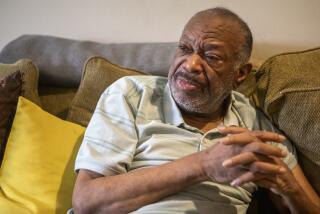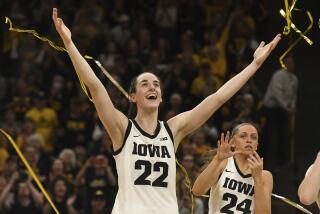Lawrence Guyot dies at 73; longtime civil rights activist
Lawrence Guyot, a civil rights leader who was threatened, jailed and nearly beaten to death in the Deep South in the 1960s and helped lead a drive to register black voters during the tumultuous Freedom Summer of 1964, has died. He was 73.
The longtime activist, who had a history of heart problems and diabetes, died at home Thursday in Mount Rainier, Md., according to his daughter, Julie Guyot-Diangone.
A Mississippi native, Guyot was one of the original members of the Student Nonviolent Coordinating Committee and served as director of the 1964 Freedom Summer Project in Hattiesburg, Miss.
PHOTOS: Notable deaths of 2012
He was founding chairman of the Mississippi Freedom Democratic Party, which sought to have blacks included among the state’s delegates to the 1964 Democratic National Convention. That bid was rejected, but it paved the way for the seating of black delegates at the party’s 1968 convention.
Guyot was severely beaten several times, including at the notorious Mississippi State Penitentiary known as Parchman Farm. He continued to speak on voting rights until his death, including encouraging people to cast ballots for President Obama.
“He was a civil rights fieldworker right up to the end,” Guyot-Diangone said.
Susan Glisson, executive director of the William Winter Institute for Racial Reconciliation at the University of Mississippi, called Guyot “a real warrior for freedom and justice” whose efforts helped lay the groundwork for the Voting Rights Act of 1965.
“Mississippi has more black elected officials than any other state in the country, and that’s a direct tribute to his work,” she said.
Guyot was born in Pass Christian, Miss., on July 17, 1939. He became active in civil rights while attending Tougaloo College in Mississippi and graduated in 1963.
That year he went to Winona, Miss., to bail out several colleagues, including Fannie Lou Hamer, who had been jailed after trying to register black voters. After inquiring about them at the jail, Guyot was confronted by nine police officers “who took turns punching me with the butts of guns ... forced me to take all my clothes off, then ... threatened burning my genitals with fire,” he said in Howell Raines’ “My Soul Is Rested,” a 1983 memoir of the movement.
The attack continued for four hours and was halted only after a doctor told the officers that Guyot could die. Bloodied and barely conscious, Guyot was thrown into jail along with his fellow activists. He was released from jail in time to attend the funeral of civil rights leader Medgar Evers, who had been assassinated days earlier in the driveway of his Jackson, Miss., home.
In late 1963, Guyot’s civil rights work landed him at the dreaded Parchman prison, where he lost 100 pounds during a 17-day hunger strike.
District of Columbia Delegate Eleanor Holmes Norton told the Washington Post in 2007 that she first met Guyot within days of his beating at the Winona jail. “Because of Larry Guyot, I understood what it meant to live with terror and to walk straight into it,” she told the newspaper. On Friday, she called Guyot “an unsung hero” of the civil rights movement.
In 1964, Guyot was a field secretary for the Student Nonviolent Coordinating Committee helping to organize the mass registration of Mississippi’s black voters. Freedom Summer drew thousands of volunteers, including white college students from the North. The possibility of violence was so great that “I didn’t expect to make it through the summer,” Guyot recalled in a 1994 interview with the Atlanta Journal-Constitution.
Three civil rights workers — Michael Schwerner, Andrew Goodman and James Chaney — were killed that summer. Guyot had almost gotten into the car with them on their drive to the Mississippi town of Philadelphia when they disappeared. Their bodies were found 40 days later.
Guyot earned a law degree in 1971 from Rutgers University and then moved to Washington, D.C., where he worked to elect fellow Mississippian and civil rights activist Marion Barry as mayor in 1978. He later held various jobs in the District of Columbia government.
In recent months, Guyot’s daughter said he was concerned about what he said were Republican efforts to limit access to the polls. As his health was failing, he voted early because he wanted to make sure his vote was counted, he told the AFRO newspaper.
In addition to his daughter, he is survived by his wife, Monica Klein Guyot; a son, Lawrence; and four grandchildren.
More to Read
Start your day right
Sign up for Essential California for the L.A. Times biggest news, features and recommendations in your inbox six days a week.
You may occasionally receive promotional content from the Los Angeles Times.



















































